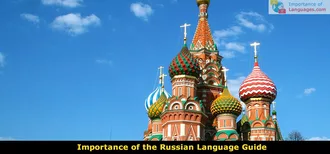Contents
Guide to Importance of the Russian Language
Why it’s Important to Learn Russian?
Do let’s explore the importance of the Russian language and why you should consider studying Russian? Russian is the most widespread language in Eurasia. Russian is spoken by roughly 260 million within Russia and aboard. Online approx 110 million Internet users speak Russian.
Quick Russian Language Facts
[icon name=”etsy” class=”” unprefixed_class=”middletext”]
Language family: Slavic group of the Indo-European
[icon name=”users” class=”” unprefixed_class=”middletext”]
Spoken by 260 Million (110m Online Readers)
[icon name=”bars” class=”” unprefixed_class=”middletext”]
6th most spoken world language
[icon name=”globe” class=”” unprefixed_class=”middletext”]
Offical Language in 8 Countries
[icon name=”history” class=”” unprefixed_class=”middletext”]
Orgin 9th Century
[icon name=”file-word-o” class=”” unprefixed_class=”middletext”]
Appox 500,000 Words – Only 2.5k words regulally used.

Countries with Russian as Offical Language

Due to Soviet influence, Russian is widely spoken in many countries throughout Eastern Europe and Asia.
Russian is the official language:
- Russia
- Belarus
- Kazakhstan
- Kyrgyzstan
- Tajikistan
- Regional language in Georgia
- Moldova
- Ukraine.
- Significant minority language in the Baltic countries and Central Asia
What other language is similar to Russian?
Some of the Slavic languages are closely related.
- Bulgarian
- Ukrainian
- Polish
- Serbo-Croatian.
- Czech is more distant.
Russian is influenced by German, French and English
Russian In Society

Despite being overshadowed by China, after the fall of the Soviet Union. Russia still boasts huge exports of oil that keep the importance of Russian has one of the biggest energy-producing powerhouses on the world stage. Learning Russian greatly improves your chances of success in the job market dealing with these economies.
Russian is an official language of many of the world’s organizations such as the Untied Nations, Nato, UNESCO, the International Red Cross Association, and numerous other international committees and organizations.
The importance of Russian can open doors to employment in a variety of occupations such as in virtually any business related to oil, teaching, translation, and interpreting.
Learning the Russian Language

[su_note note_color=”#66bdff”]People who start learning Russian state that its’ the most difficult language in the world. Their statements are very fair and justified indeed. The Russian language is considered one of the most complex languages. [/su_note]
Russian Alphabet
The Russian language really is difficult for foreigners, especially for the ones who have never dealt with the Cyrillic alphabet.
Russian is difficult on all possible levels of its linguistic performance – spelling, pronunciation, grammar, syntax…
You need a whole bunch of all possible Ps in order to successfully master it. Needless to say that preferably you should combine your patience, persistence, positive thinking and passion with communicating with native speakers – Russians – after you’ve learnt the language enough to start communicating in it.
Russian spelling is based on Cyrillic alphabet which is Greek to you if your native language ‘deals’ with the Roman alphabet. Here you’ll find a vast range of letters which look absolutely different from the ones from English, Spanish or French (there are a few exceptions when letters of the two writings look similar). Make sure you are patient and persistent enough to eagerly proceed with your Russian education.
Russian Grammar
Russian pronunciation isn’t any easier… When reading in Russian, you are to pronounce letters according to endless amount of rules which suggest that the way a word is written and the way it’s pronounced are two different stories from one and the same field called unique (or uniquely difficult) Russian spelling.
If you decided to profoundly go into Russian grammar – you are a brave person! For Russian grammar is Greek even to Chinese people whose language is considered one of the most difficult languages ever… Numerous categories and terms (extremely extended grammar comparing to other languages) represent the immense difficulty of the Russian language.
But if you are serious in your intention to master this language, you won’t go off your persistent and patient track, we are sure of it. If you are planning to travel to Russia, knowing the language will be of vital importance to you and will help you learn Russian culture which truly amazes with its generosity, poetic spirit and immense soul full of kindness and gentleness.
Russian Alphabet And Russian Numbers
Learning to read the Russian Alphabet should be the first stop for Russian beginners. The Russian alphabet is written using the Cyrillic script using 33 letters.
You should be easily able to understand the Russian Alphabet because it has the exact same letters and style of writing as English. Where they differ though is in pronunciation. Russian Numbers are the same way.
Russian Vocabulary and Russian Phrases
Logical next step for Russian beginners after learning the Russian Alphabet would be to start developing your Russian vocabulary with Russian words and phrases.
Russian only has 200,000 words (vs 1m in English)
What are the Russian vowels? There are five Russian vowel sounds, which are spelled with one set of letters (а, о, у, э, ы) after hard consonants and with an alternative set of letters (я, ё, ю, е, и) after soft consonants. Memorize both sets of letters in order to read Russian correctly: ! а о у э ы – indicate that the preceding consonant is hard
English Words in Russian
Few English words are of Russian origin (10% of Russian words are similar to English ones).
Interesting examples include:
- Bolshevik
- Cosmonaut
- Mammoth
- Pogrom
- Sputnik
- Tsar
- Vodka
Interesting Facts about Russian

There’s a rule against Russian words starting with the letter “A”.
Since the earliest times, native Russian words almost never start with the letter “A”. Some notable exceptions include азбука (alphabet) and авось (perhaps), but these exceptions are far and few in between. If you see a Russian word that starts with “A”, there’s a good chance that it’s borrowed from another language.
Russian surnames vary by gender.
Russian names consist of a first name, a family name, and a patronymic name, which is the father’s name plus the ending -ovich for a son and -ovna for a daughter.
So if a father named Ivan has a son and a daughter, his son’s patronymic name will be Ivanovich and his daughter’s will be Ivanovna.
All adjectives have multiple syllables.
Many Russian words consist of one syllable, or even just one character. However, virtually all adjectives have two or more syllables.
In Russia, Your Middle Name is Your Father’s name.
In Russian, your first and last name are not enough. Your Middle Name is Your Father’s name.
Russian Language Learning Tools

If you are really serious about learning Russian and want to maximize your time then you should consider using a Russian language course to further aid you in your quest to learn Russian. There are several great programs out there that deliver a great language learning experience. The advantages of a language learning program are the organization and having a next step already lined up. Most break down the lessons into 30-minute intervals that can fit into any type of schedule. Flexible to retry a lesson to make sure you understand what you are learning and give you confidence in succeeding. Examples of great Russian language programs can be found below.
Examples of Great Russian language programs can be found below:


Russian is widely used in the North of Eurasia, but it’s also one of the most bullied languages in the world right now. Some countries in Eastern Europe and in Northern Asia try to squeeze the leftovers of the Russian language out of their countries, their street signs, their memories. Though the Soviet Union was wrong and the Russian army is thought to be occupants by many nations, the Russian language itself is hardly to blame. Nations kill, occupy, make political mistakes, but languages don’t. But anyway, Russian happened to be called “the threat”, “the bloody regime tool” and even Cyrillic was switched into Latin in some ex-Soviet countries. So, the learners of Russian are really brave. The funniest thing is you don’t have to be Russian to speak Russian. This languages may be adopted by anyone in the world and across the Universe.
You’re right, however this is not the psychology of the masses anywhwere, nor of those who try to lead those masses….. 🙂
I learned a lot about languages that I never knew before! However can you please add a Learn Russian Basics Guide and a Learn Japanese Basics Guide?